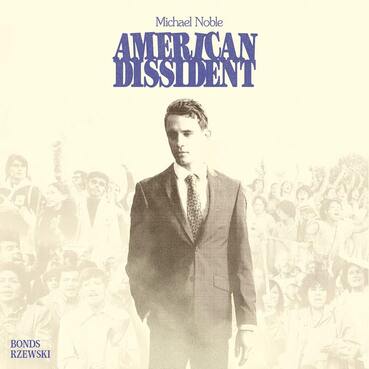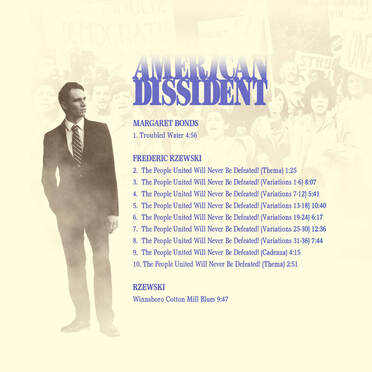And now something completely different. Michael Noble plays piano music of Frederic Rzewski.2/25/2023 First - full disclosure. I received a copy of this CD, gratis, from the pianist himself with a request for a review. I don't accept promotional discs very often; all of the recordings I write about are those which interest me and have been purchased by me for my own personal pleasure. But after reading Mr. Noble's bio, and with some curiosity in his chosen repertoire, I accepted his offer.
Michael Noble holds doctoral and masters degrees from the Yale School of Music, and a BM and BA in English Literature from the Eastman School of Music and University of Rochester, respectively. Interestingly, he informed me he wrote his doctorate thesis on the composer, Frederic Rzewski, whose music is featured on this CD. I was intrigued. As I listen primarily to orchestral and chamber music, I'm getting a bit outside my comfort zone with this program of contemporary solo piano music. However, I was a pianist back in the day (sadly some arthritis and lack of motivation keep me from playing much any more), so I do have a deep interest in and appreciation for piano music. This CD is not a major label release. Mr. Noble is his own producer and it was recorded in the recording engineer's own studio in New York City. Thus I began listening with some uncertainty. But this disc immediately caught my attention with its wonderfully satisfying recorded sound. Instantly this piano sounds like a real Steinway. The left-hand range is full, rich and resonant, while the right-hand octaves reveal the unmistakable Steinway ringing tone. The concert grand piano is extremely difficult to capture on record and even more difficult to reproduce on a home stereo system. Fortunately, the engineer for this recording, Vyacheslav Gryaznov, is obviously highly skilled and got it absolutely right. The piano is placed within an ideal acoustic, with a 3-dimensional presence perfectly distanced from the listener, and its warm, beautiful sound won me over. It helps that my stereo system is capable of handling the playback with aplomb. As to the music, I thought this would be a difficult review to write, as I am not familiar with these composers and am often critical of contemporary music. But from the very first notes, I began enjoying what I heard and was anxious to jot down some thoughts. As this music may be unfamiliar to many, I will attempt to be a little more detailed in my description than I normally would. While the recorded sound initially drew me in, the music of Margaret Bonds kept me there. Her Troubled Waters, based on an African-American spiritual, is instantly and unmistakably American in flavor. It is rhapsodic, reminiscent of Gershwin, tuneful and immensely pleasing. It is stylishly played here by Michael Noble with such rhapsodic freedom and dynamic flair, I was reminded often of the late, great Earl Wild. Which is high praise indeed! It was interesting to learn reading the booklet that this is the final movement of a collection of 3 piano pieces called Spiritual Suite. It is so wonderful I wish Mr. Noble had recorded the other two selections as well. Coming in at just 5 minutes, this was over much too soon. The vast majority of the program is occupied by the colossal (lasting an entire hour!) Theme and Variations on the New Chilean song, The People United Will Never Be Defeated!, composed in 1975 by American composer Frederic Rzewski. After the theme is stated, its structure consists of 36 variations, grouped into 6 sections (or cycles), all played without pause. The piece then concludes with a Cadenza and a final expanded recapitulation of the theme. It is a very long, sprawling work of unimaginable difficulty, but the variety is so ever-changing and endlessly interesting, only rarely did I become distracted. But, in honesty, it takes a bit of determination to get through it. (More on this below.) After the tuneful and highly attractive main theme is announced, the first set of variations begins rather simply, reminding me very much of Rachmaninoff's famous Variations on a Theme of Paganini. The tuneful, playful simplicity is deceptive though, and doesn't last long before becoming more wayward and positively improvisational. I loved this first set of variations for that very reason. Their improvisational freedom is highly appealing, and I found myself imagining Mr. Noble had just sat down at the piano and began noodling around, just enjoying himself and making it up as he went. It is so free and spontaneous, it doesn't sound like the music had been notated on the page. And I was hooked. The next set, though, becomes more rhythmically insistent and decidedly more "modern". It soon gets carried away with some wild glissandi and audible participation form the pianist himself - both physically (the startling bang of the keyboard lid being slammed shut), and vocally (some groaning and guttural humming). I hoped these extraneous noises wouldn't continue for long, and mercifully they didn't. Soon the next set is ushered in with a distinct change of mood, where Rzewski takes us firmly into early 20th-Century America with some blues (based on what sounds like folksong) enveloped in some of the same freely rhapsodic form heard in the opening Bonds work. Outright jazz soon takes over in a most delightful interlude and this quickly became my favorite section thus far. What comes next is surely the most traditionally pianistic section of the entire piece, taking us back in time to Liszt, with passages of fast repeated notes and virtuosic writing up and down the keyboard. Rachmaninoff again comes to mind (hints of his Paganini Variations are never too far out of sight), restoring a Romantic influence. If Noble's piano playing had thus far impressed with his free-flowing, seemingly improvised creative style, he proves himself an extremely accomplished concert pianist here. He plays with crisp, clean articulation, with very little pedal to muddy the waters, and no fluff whatsoever. This is very impressive piano playing of some very difficult music. The longest section (12 minutes) which comes next is also the most varied in mood, style and atmosphere. There is some complex counterpoint, followed by a return to freely improvised invention, flowing into a most attractive section of what I would describe as "interpretive fantasy". There are some driving, rhythmic passages too, reminding me a bit of movie music, before transitioning to the final set of variations - which incorporates all the elements which have come before. And this, along with the cadenza (which is improvised here by Mr. Noble) and concluding recapitulation of the theme are surely my favorite passages in the entire piece, as they contain all the variety heard earlier but in a condensed, more palatable serving. I admit to listening to this piece in two sessions. It was simply too long (for me) to digest in one sitting. Committing to its hour-long length, in its entirety, will likely only be attempted by dedicated pianists and the most avid admirers of contemporary piano music. Ultimately though, contemplating how this pianist (or any pianist, for that matter) can learn all these notes is simply mind-boggling. That Noble managed it and makes sense of it all, with purpose, enthusiasm and musical consideration, is quite simply phenomenal. If that weren't enough (and really it was), Noble concludes the concert with an encore - one more work by Rzewski: Winnsboro Cotton Mill Blues. Clocking in at nearly 10 minutes, though, it is substantially more than just an encore! I expected something rather lighthearted, given its title, and indeed was craving something light, upbeat and fun after the enormity of the Variations. But alas, it's a fairly serious, driven work - largely atonal, with some heavy, dissonant, lower-octave meanderings, along with driving rhythms - all of which were a bit relentless. Just as I was about done with it, there is a pause and a welcome return to improvisation. But it's less melodic than in the Variations and remains obstinately atonal. Finally, right at the very end, we get a taste of what the title promised us - a minute (or less) of Cotton Mill Blues, sounding much like a Joplin rag (with a hint of boogie-woogie) before flying out of control off the top end of the keyboard. And with that, the concert ends. In closing, this recording is quite an achievement. And certainly showcases Michael Noble to be a fantastic pianist. If in all honesty I didn't love all this music outright, I enjoyed much of it and certainly respect and admire the composer who can not only conceive it, but actually notate it all on the printed page. Once again, though, I must especially praise the opening work by Margaret Bonds, which is absolutely glorious. I want to seek out a recording of the entire Spiritual Suite from which it is derived. And I can't help but lament that Mr. Noble didn't record all of it, perhaps in place of the final Rzewski piece. I am told the CD is not currently available commercially. The recording is, however, available for purchase via digital download and streaming services. There are extensive notes about the composers and the music, excellently written by Mr. Noble himself, which I assume are available via download as well. For more information, visit michaelnoble.hearnow.com.
0 Comments
Leave a Reply. |
Proudly powered by Weebly


 RSS Feed
RSS Feed